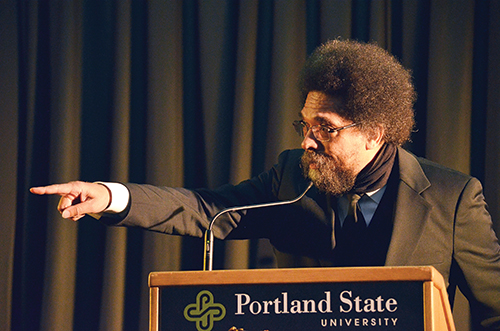
In light of scholar and activist Dr. Cornel West’s visit to Portland State earlier this month, students and educators gathered to continue the conversation about diversity and race.
“I’m calling this a conversation for a reason,” said Dr. Samuel Henry, a professor in the Graduate School of Education and organizer of the event. “We aren’t ready for a dialogue yet, but we are ready for a conversation.”
The conversation took place on Wednesday at an event titled “Race Matters,” hosted by PSU’s Diversity Action Council, a student organization that aims to prepare students for success in a diverse global community.
Rather than focus on abstract, universal ideas of diversity and race in American education, the event aimed to brainstorm ways PSU could better serve communities of color in five roundtable discussions.
West’s lecture on Jan. 15 left many attendees inspired, with new tools and ideas to incorporate into their education, careers and communities.
At Wednesday’s event, however, Henry was quick to temper the optimism in his opening remarks as he explained to the 40 or so in attendance that racial issues at PSU cannot simply be solved with good intentions.
Phillip Dirks is the director of Upward Bound, a PSU program that seeks to help low-income and first-generation high school students transition into college. To him, clear and delineated inequalities can be seen in a myriad of statistics when comparing students of color to white students.
“Sometimes even getting people to see there is a crisis is a crisis in and of itself,” he explained to his table. Dirks described explaining to parents statistics such as the high school dropout rate, which is nearly doubled for students of color when compared to their white peers.
“It seems difficult for white parents to even contextualize these numbers because they don’t have to worry about them,” he said. “It’s like they don’t even care.”
But difficult problems such as the statistics Dirks offered helped some students redirect the conversation to the university’s role as a liaison to Portland itself. Patrick Villaflores, a student worker in the Office of Academic Affairs, addressed his table with a challenge.
“What we should be asking is what our role is, as members of the PSU community, in reaching out to the greater city of Portland and our communities of color,” Villaflores said.
Ideas began to materialize through the roundtable discussions, and all at once a table lit up with a litany of students describing their experiences with university programs such as Student Parent Services; which, one student mentioned, seemed totally hidden until she went to the effort to seek it out upon arriving at PSU.
Some suggested requiring students to attend the events put on by various student groups. Others
referenced recent submissions to the provost’s ReTHINK PSU challenge, such as offering community members who interact with practicing researchers a credit that could be used for educational programs at PSU with the goal of encouraging continued education for those who might otherwise lack the opportunity.
But, ultimately, most participants realized the conversation started that afternoon was only the beginning, and that the hardest work still lies ahead.

